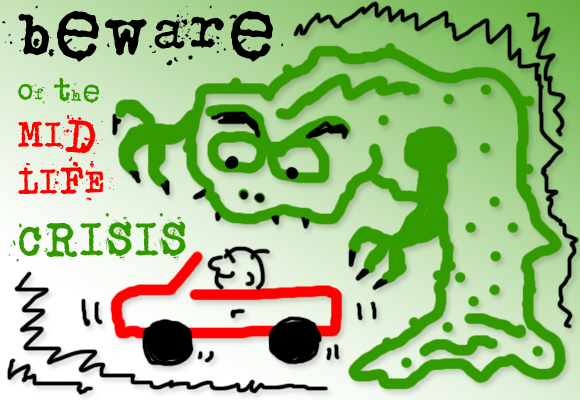I have heard the term ‘midlife crisis’ for awhile but I never really knew what it meant. I figured since I am creeping towards middle age (or maybe I am there?) I had better understand what this legendary horrible monster is.
As anyone serious about unearthing the truth about anything, I quickly went to the one source of truthful, unbiased information: the internet 😉 and typed in ‘midlife crisis’. Here is what I found…
Midlife crisis: A period of personal emotional turmoil and coping challenges that some people encounter when they reach middle age, accompanied by a desire for change in their lives, brought on by fears and anxieties about growing older.
The phrase “midlife crisis” was introduced in 1965 by the psychoanalyst and social scientist Elliott Jaques in a study of creative geniuses. In the lives of numerous composers and artists, Dr. Jaques found abrupt changes in style or declines in productivity about age 35. (Taken from MedTerms.com)
Ok so there is ‘turmoil’ and ‘coping challenges’. Sounds like my house at about 4:13PM when the boys get home from school. I cope by a Bloody Mary or a glass of boxed red wine from Costco. My wife prefers a glass of ‘Two Buck Chuck’ from Trader Joe’s. No coping problems here.
Here’s another definition taken from www.PsychologyToday.com:
Middle age is a time in which adults take on new job responsibilities and therefore often feel a need to reassess where they are and make changes while they feel they still have time.
The midlife transition (or crisis) can also be understood using a Myers-Briggs personality model stemming from the works of Carl Jung. The stages are as follows:
- Accommodation—presenting ourselves as different people (“personae”) based on our situation
- Separation—removing the personae we wear in different situations and assessing who we are underneath; rejecting your personae, even if only temporarily
- Reintegration—feeling more certain of your true identity and adopting more appropriate personae
- Individuation—recognizing and integrating the conflicts that exist within us, and achieving a balance between them
Ooooh ok, this is getting somewhere. I think I get it. What I don’t get is why this is called a ‘crisis’? This sounds like freakin’ midlife liberation. A ‘Midlife Burn-your-neckties-and-dance-in-your-underwear-cuz- all-that-shit-you thought-mattered-does-not-matter-anymore-slap-your-grandma-liberation-bash.”
Essentially, its ” Stop being who you are not, start being who you are. And this is a crisis, why? Ok one more:
What’s a midlife crisis? It’s the stuff of jokes and stereotypes — the time in life when you do outrageous, impractical things like quit a job impulsively, buy a red sports car, or dump your spouse.
For years, midlife crisis conjured those images. But these days, the old midlife crisis is more likely to be called a midlife transition — and it’s not all bad.
The term crisis often doesn’t fit, mental health experts say, because while it can be accompanied by serious depression, it can also mark a period of tremendous growth. ( Taken from www.WebMD.com)
Now we’re getting somewhere. Its not all bad…in fact it sounds like a really good thing if you understand it and realize whats going on. Its a crossroads. You can take one path of the other.
There is the path of ‘Crisis’, which involves depression, severance of relationships, going on a buying frenzy to get impressive stuff and other not-so-healthy behaviors. Personally, I would like to avoid this path.
Then there is the path of ‘Transition’, which I believe is why I started this blog and why you are reading it. Its the realization that the things that you were taught to value so highly the first 30+ years of your life may have simply been an inherited, imposed or chosen package of beliefs that are suddenly (and refreshingly) not useful anymore.
Its why you are starting to lean away from consumerism, why you get physically ill watching some of the stuff that passes for entertainment on the television these days, and why what the boss or coworkers think of you seems to have less importance as the days go on. The veneer is wearing off and those things you once held up as symbols of your personal success or identity are looking a little dinged up. The years and experiences of your life have sharpened your senses and you are not easily bamboozled by the ‘Sham-wows’ and ‘Amways’ of life. You just don’t buy it anymore.
You are learning not to care about certain things, and care more about certain people – and it feels right. This is a good thing. Its a wake up call, friend, for you and I to stop hitting the snooze bar on our lives.
So without further ado, here are a few techniques that have been useful for me in keeping myself on the path of transition and avoiding the crisis (Although I still would not mind having the red convertible sometimes):
1. Accept the truth that you will have regrets (and that’s OK).
I always laugh when I hear people say they have no regrets. Bullshit. Horse pukey. The fact that I have mistakes in my past and opportunities I missed is the very reason why I live the way I do now, which is more deliberately. My regrets motivate me to be stronger, more purposeful, more deliberate with my time and resources, more living by the moment. I spend less physical, mental, and emotional time on things that do not matter and I invest in experiences that I can remember and relish when I’m 80. No one on their death bed wishes they would have spent more time at the office or watching reality TV. Get the idea?
This is coming from someone who has been addicted to self-help books for the last decade to try and fix some broken internal part. The belief is if I can just find that book, that principle, that medicinal thought pattern, then I will be better, be normal, be happy. Although there is great value in certain personal development tools, I argue that they are not going to have a lasting effect unless you learn to forgive yourself (and others) for whatever you need to. Do this and your insatiable need for the next self-help bestseller will vanish.
2. Forgive yourself.
Forgiving yourself is a tough thing for most of us. For men, we tend to believe that letting ourselves off the hook equates to weakness. Plus, we’ve used whatever the issue was for so long to motivate us, drive us, and keep ourselves striving that we’re essentially addicted to it.
Forgiveness has nothing to do with religion. Read that again. Forgiveness is faith-independent. Is it perpetuated in many faiths all over the world? Absolutely. My point is that you can be an atheist and be able to forgive. I say this because for years I believed that my ability to forgive was attached to my faith and that it only operated in conjunction with it. Not so.
An excellent definition of forgiveness that I heard years ago:
“Forgiveness is giving up on the belief that the past could have been any different.”
Forgiveness is hard. Forgiving yourself can be really hard. I think it has something to do with the belief that things must to be hard in order to be worth it. Plus, we like to use our past mistakes as leverage to drive us forward. Guys like tools and levers and guilt over past mistakes can be a powerful fulcrum. Forgive yourself.
3. Get busy recreating yourself TODAY.
Some wise man said, “the longer you remain in the herd, the harder it is to leave.” You must take an action today, no matter how small, toward a course of action that is more about who you are (and away from who you are not). This is an exercise in turning the ship, in taking the less traveled path, in letting your ‘inner child’ play in the mud. Yes you must do it today, no it can’t wait.
You must break your routine. You must do something different today, and then tomorrow, and then the day after that. You must set yourself up for unpredictability. No, don’t go do anything life-threatening necessarily (lets keep you around awhile). Do some little thing today that is a part of who you are. Ask yourself these questions:
- What is that ‘thing’ you were into in your earliest memories as a child?
- How did you spend your time before you ever had any concept of having to make money or be responsible?
- What were the things you could lose yourself in for hour?
- What are some things you have talked yourself out of in the name of being sensible and ‘grown up’?
Now, go DO one of those things TODAY. Seriously. Go take a walk in the woods or drive to a hobby store and pick out that model airplane kit you loved as a kid. Go find a how-to course on playing Blues harmonica and get busy. Find an art supply sore and buy yourself a sketchbook and pencil set and draw ANYTHING. Start there and see what happens.
And by the way, your ‘sensible’ responsible, more sophisticated self will probably chime in with something like, “…Seriously? Are you really going to go do that just because some dude on a blog says you should? Really? Don’t you have a yard to mow or a report to finish?” so be prepared to ignore that voice. It is the voice of Crisis.
If you’re standing at the crossroads of Crisis and Transition and Crisis looks a lot easier, muster your courage and strap on a machete. Steer yourself towards that muddy, overgrown, bramble-covered, unfamiliar path with the rusty sign at its trail head that says ‘WHAT IF?’ and get your ass moving. You won’t regret it.
Carpe Diem.










Love this: If you’re standing at the crossroads of Crisis and Transition and Crisis looks a lot easier, muster your courage and strap on a machete. Steer yourself towards that muddy, overgrown, bramble-covered, unfamiliar path with the rusty sign at its trail head that says ‘WHAT IF?’ and get your ass moving.
‘Nuff said.